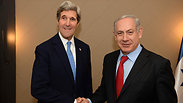
"We would like to resume peace negotiations, and we think that both sides should take steps to make that possible," State Department Spokeswoman Marie Harf said on Friday, commenting on statements made by Prime Minister in an interview with Bloomberg's Jeffrey Goldberg published Thursday in which he said that Israel is considering unilateral steps.
The US spokeswoman further added that "no one should take any steps that undermine trust, including unilateral."
Related stories:
- Netanyahu mulls unilateral disengagement from West Bank
- Inside the talks' failure: US officials open up
- Kerry says Israel responsible for peace talks crisis
Harf also stressed that Martin Indyk intends to resume his role as US special envoy to the Middle East peace process, and that he has not made any announcement of retirement. "He's here. He's working. I don't have any predictions to make…about staffing going forward.
"You guys are kicking him out the door before he's gone," the American spokeswoman retorted to journalists enquiring about the US envoy's rumored departure.
In the interview with Bloomberg's Jeffrey Goldberg published Thursday, Netanyahu discussed the failed attempts at US brokered peace talks with the Palestinians, suggesting that to move forward, Israel may need to consider taking unilateral steps to achieve its goals.
"It's true that the idea of taking unilateral steps is gaining ground, from the center-left to the center-right. Many Israelis are asking themselves if there are certain unilateral steps that could theoretically make sense," Netanyahu said.
Commenting about Netanyahu's interview, Harf said: "We don't think either side should do anything to complicate efforts right now to build the trust necessary to resume negotiations," further stressing that the American "position has not changed."
"No one should take any steps that undermine trust, including unilateral," the US spokesman said, emphasizing that the US "would like to resume peace negotiations."
Netanyahu's references in the interview address suggestions that Israel begin testing unilateral disengagement from the West Bank that would force Palestinians to take up key responsibilities in the areas of security and administration that Israel currently manages.
With careful planning, such a plan could lead to an independent Palestinian nation on Israel's terms and without negotiations, though tensions between the neighbors would most likely remain high and Netanyahu stressed important security concerns that such a plan does not address.
"People also recognize that the unilateral withdrawal from Gaza didn't improve the situation or advance peace - it created Hamastan, from which thousands of rockets have been fired at our cities."
While the prime minister did admit that new ways to move toward peace are being explored, he stressed that the conversation is on-going and hasn't yet brought any conclusions.
"Let me be clear - negotiations are always preferable. But six prime ministers since Oslo have failed in their pursuit of a negotiated settlement. They've always thought we were on the verge of success, and then Arafat backed off, Mahmoud Abbas backed off, because they can't conclude these negotiations," said Netanyahu.
Netanyahu also touched on accusations that claim to Israel takes part in aggressive espionage against in the US by firmly stating, "This is an outright lie. Since Pollard, almost 30 years ago, Israel has not conducted any espionage operations in the United States, period. Full stop. Not direct espionage, not indirect espionage, nothing, zero. We do not conduct in any way, shape or form espionage operations in the United States."
The prime minister stressed that while differences has arisen in their approaches to handling the Iranian threat of nuclear power, relations with US President Barak Obama remain strong.















